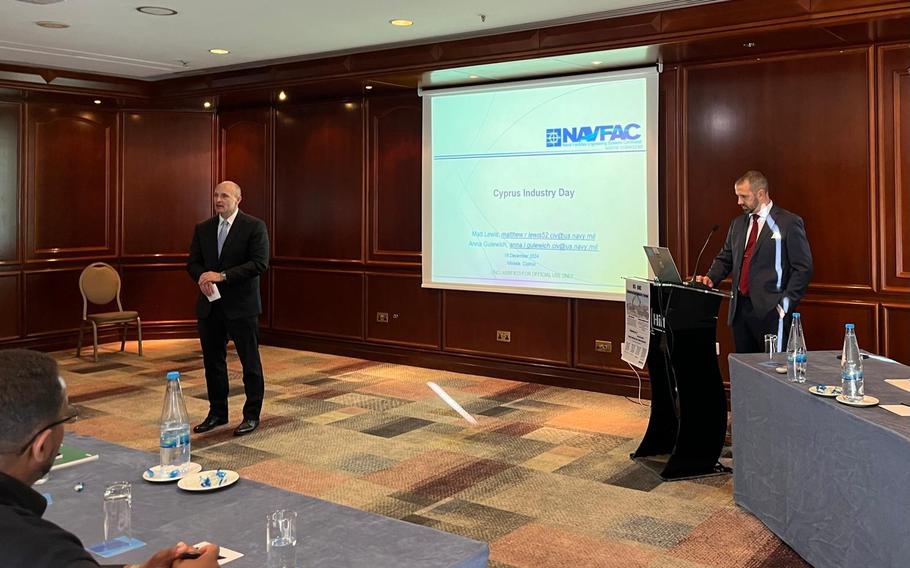
Naval Facilities Engineering Systems Command holds a Cyprus Industry Day in Nicosia, Cyprus, in December 2024. NAVFAC is scheduled to hold a similar event in Belgrade, Serbia, on March 4, 2025. (Naval Facilities Engineering Systems Command)
NAPLES, Italy — The Navy is reaching out to businesses about American-led construction projects in Serbia, as the U.S. works to build and maintain a presence in a country historically tied to Russia.
Next month, Navy officials will host a half-day conference in Belgrade for businesses to learn about upcoming design and contracting opportunities, Naval Facilities Engineering Systems Command Europe-Africa, which is headquartered in Naples, said in a statement last month.
The forum, the first held in Serbia, is a chance for business owners to gain familiarity with NAVFAC and the U.S. government, Don Maconi, director of NAVFAC and Navy Region Europe Africa Central’s expeditionary section, said in the Jan. 29 statement.
He added that it also allows the command to support the fleet “and our nation’s strategic goals.”
U.S. relations with Serbia, a landlocked southeastern European country on the Balkan Peninsula, have fluctuated over several decades.
That’s due in part to U.S. interventions in Bosnia and in Kosovo, which America recognizes as independent and Serbia considers its own.
But relations have improved, with the U.S. providing more than $1 billion in aid to Serbia since 1998 to help it develop into “a prosperous democracy, at peace with itself and its neighbors, and integrated into regional and Western institutions,” according to the State Department.
It’s unclear whether similar aid packages will continue following a freeze on most foreign aid ahead of reviews by the Trump administration.
However, military efforts are ongoing, such as an Ohio National Guard-led partnership that includes training and other activities with the Serbian armed forces.
The Navy’s March 4 informational meeting will include familiarizing Serbian business owners with potential projects and how to participate in bidding, said Paul Cage, a NAVFAC spokesman.
The program, part of a Defense Security Cooperation Agency initiative, is focused on humanitarian work, such as building schools and other infrastructure, with the Navy acting as a project manager and local contractors doing the work, Cage said.
For example, the Navy is overseeing the construction of school buildings in the southeastern town of Prokuplje. That $999,000 contract was awarded in September, according to sam.gov.
It was unclear Wednesday whether the project and others like it already awarded were affected by the White House aid review.
Navy endeavors in Serbia are consistent with the service’s decadeslong efforts to build relationships through humanitarian assistance and other activities, said Bradley Martin, a retired Navy surface warfare officer and director of the Rand Corp. National Security Supply Chain Institute.
Such projects create influence, maintain access and promote cooperation, Martin said. The goodwill created is an inexpensive way to reach countries that might not be immediately important but collectively would be significant if the U.S. was dealing with a crisis, he said.
“Any one country might not be completely essential to U.S. national security,” Martin said. “But collectively, having good relations with countries throughout the region is important. ... And being able to call on them if we were dealing with a crisis is valuable.”